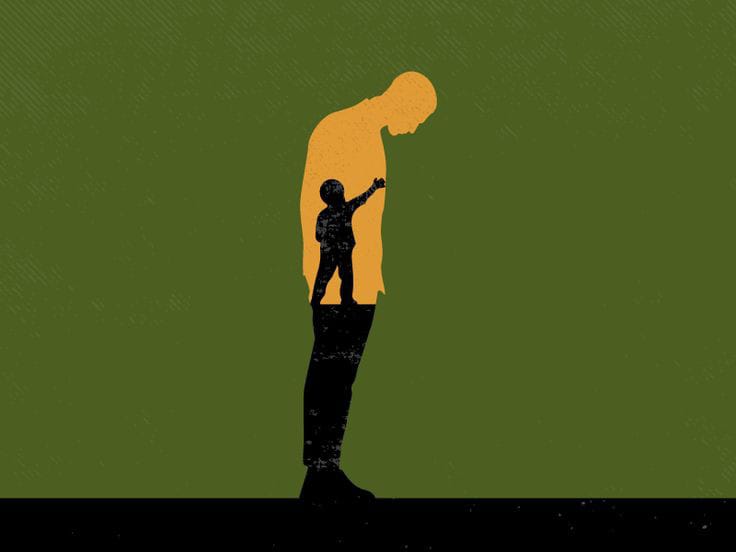Have you heard that our childhood has a huge impact on our life? That impact is especially true for our adult life. If you had a good childhood, your adult life will be more positive. Either way it is physically or mentally. Research indicates that positive childhood experiences and negative childhood experiences affect individual physical and mental health in adulthood (Daines et al, 2021).
It means that childhood experiences provide valuable life lessons. Childhood experiences can also influence adaptation throughout life, and this is the essence of the inner child (Sjöblom et al, 2018). The term “inner child” is certainly familiar is not it? The fact is that this term itself is widely discussed on various social media platforms by so many people these days. But do you know what it actually means?
Inner child is the primary unconscious force of what was learned and experienced in the early years of our life. Then it can be said that the inner child is captured from our childhood experiences. Although it is in the unconscious, the inner child can influence our current life (Hestbech, 2018).
It means that the concept of the inner child refers to the emotional, psychological, and developmental stages of our childhood that continue to influence us as adults (Sjöblom et al, 2018).
According to Bradshaw’s recovery therapy, he thought that there is a child in all of us, and every person must have a different background about the child. If the child has been through a lot of pain and fear and emptiness and loneliness, as a grown-up we must take care of it. It is hugely helpful to heal our health, physically or mentally. It means that by recognizing and treating our inner child can increase our overall mental and emotional health.
Beside that, based on the American Journal of Psychotherapy, there was a psychotherapy that reported that the inner child refers to the child that the patient once had and with whom the patient may, to some extent, have lost contact on the way to adulthood.
The purpose is to help patients reconnect with their inner child to free themselves from maladaptive emotional and behavioral patterns. Those maladaptive things are such as ignoring stressor, numb emotions, procrastination, or even isolating themselves from colleagues and friends. If we continue to be chained to those maladaptive things, then our lives are difficult to reach the well-beingness.
By recognizing and treating the inner child well, it will provide well-being in our life. Connect with the younger self to bring lightheartedness and healing life (Cohen, 2023). For this reason, the relation of the inner child to health and well-being is significant.
The inner child is present throughout the lifespan. In going through daily challenges, it is unavoidable that our inner child will emerge. This emergence could turn something bad into good, or even interfere with the person (Sjöblom et al, 2016).
Pleasant moments and events with family, closest people, and the environment in our childhood will create a good mentality in the future. Conversely, sad moments or events that we get in our childhood cause inner child wounds that will create negative feelings and behavior (Surianti, 2022).
Whether the inner child has a positive or negative influence in adult life depends on the role of our parents in our childhood (Dewi et al, 2023).
In fact, parents hold an important role in improving their children’s well-being. Early mother-child and father-child relationships and parental support are essential for a child’s health in adulthood. So, parenting in our childhood will affect our health and well-being in adult life (Chen, 2022).
According to Raising Children Network, children learn about themselves and their world through relationships with parents. By building a warm, positive, and responsive relationship with their child, it will give the child a strong foundation for the rest of the child’s adult life.
Overall, the relationship between the inner child and parenting has a significant impact on adult life health and well-being. Therefore, it is important for parents to understand and implement good parenting to support their child’s development and achieve good personal well-being in adulthood. In addition, it is important for us to manage and develop our inner child to achieve emotional well-being, behavior, and healthy social relationships.
In addition, research has shown that the phenomenon of the inner child, reflected in events during childhood experienced by older persons, can encompass positive and negative experiences that impact health and well-being in adulthood.
Penulis:

Evangelist Cesya Cherlinta
Mahasiswa Psikologi Universitas Pendidikan Indonesia (UPI)
Editor: Ika Ayuni Lestari
Bahasa: Rahmat Al Kafi
Ikuti berita terbaru di Google News
References
Chen, P. (2022). Inner child of the past: long-term protective role of childhood relationships with mothers and fathers and maternal support for mental health in middle and late adulthood. Social Psychiatry and Psychiatric Epidemiology, (57), 1399–1416. https://doi.org/10.1007/s00127-021-02200-y
Cohen, S. (2023, October 2). A Path to Well-Being: Recognize Your Inner Child. Shondaland.com. Retrieved December 22, 2023, from https://www.shondaland.com/live/body/a45251565/a-path-to-well-being-recognize-your-inner-child/
Daines, C. L., Hansen, D., Novilla, M. L. B., & Crandall, A. (2021). Effects of positive and negative childhood experiences on adult family health. BMC Public Health. https://doi.org/10.1186/s12889-021-10732-w
Dewi, E. M. P., Putri, R. F. D., Sulistiawati, S., Musdalifa, M., Syam, U., Safaruddin, N. U., & Dwianri, N. J. P. (2023). Mengenali Inner Child Untuk Berdamai dengan Luka Masa Kecil. Madaniya, 4(2), 640-648. https://doi.org/10.53696/27214834.356
Hestbech, A. M. (2018). American Journal of Psychotherapy. Reclaiming the Inner Child in Cognitive-BehavioralTherapy: The Complementary Model of the Personality, 71(1), 1-49. 10.1176/appi.psychotherapy.20180008
Relationships & child development. (2023, March 22). Raising Children Network. Retrieved December 19, 2023, from https://raisingchildren.net.au/newborns/development/understanding-development/relationships-development
Sjöblom, M., Öhrling, K., & Kostenius, C. (2018). Useful life lessons for health and well-being: adults’ reflections of childhood experiences illuminate the phenomenon of the inner child. International journal of qualitative studies on health and well-being, 13(1).
Sjöblom, M., Öhrling, K., Prellwitz, M., & Kostenius, C. (2016). Health throughout the lifespan: The phenomenon of the inner child reflected in events during childhood experienced by older persons. International Journal of Qualitative Studies on Health and Well-being. https://doi.org/10.3402/qhw.v11.31486
Surianti. (2022). Inner Child: Memahami dan Mengatasi Luka Masa Kecil. MIMBAR Jurnal Media Intelektual Muslim dan Bimbingan Rohani, 8(2), 9-18.















